Straight Line Crazy
Written by David Hare, directed by Nicholas Hytner and Jamie Armitage
The Shed, 545 West 30th Street, New York
Runs through December 18 (sold out)
Robert Moses is pissed off. He paces around screaming. The blood rushes to his head; his face is bright-red, then so red it’s white again, whiter than it was to begin with. Spittle flies from his mouth. His head is enormous, round, his hairline receding. His pants are pulled up to his waist by suspenders, their crotch hanging well below his actual anatomy. The overall impression is of a barrel-chested, ill-tempered brute of a man who will get his way only by blunt force.
You could ask exactly when in Straight Line Crazy Moses acts so overtaken by his anger, but there would be no point. In the 150-minute run of show, Moses—portrayed by Ralph Fiennes, who seems to not be channeling Moses but rather straight-up possessed by him—inhabits only one single, blood-red register. He is always this way: angry Moses, petulant Moses, foaming-at-the-mouth Moses, resentful Moses, condescending Moses—disdainful, unhappy, torturous, petty, laughable Moses.
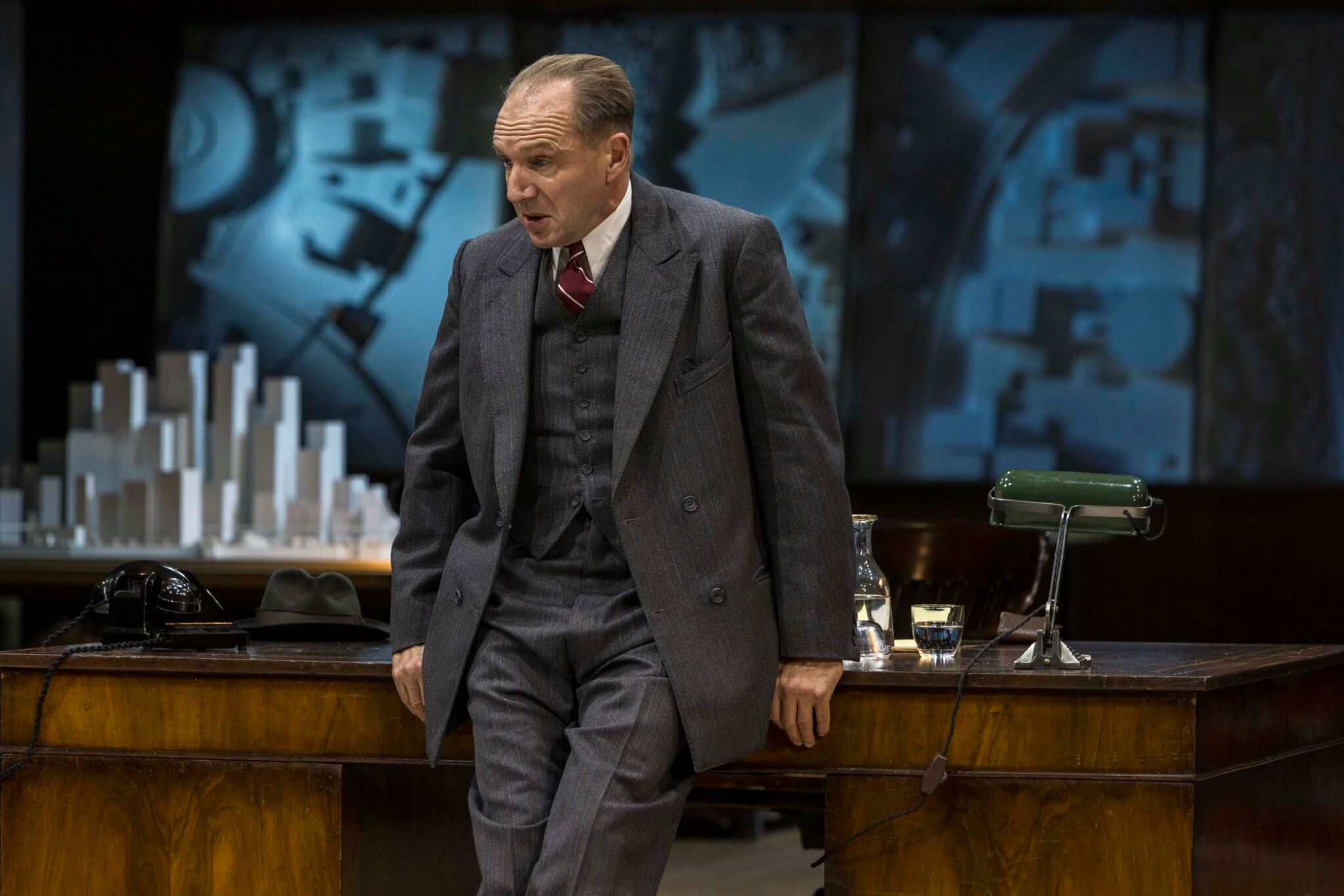
If Fiennes seems possessed, it’s because Moses’s character is written by Hare not as someone might write a person but as they might write a demigod, someone whose motives and subsequent actions don’t stem from their material reality but from something else entirely, something ineffable, not earthly but earth-shaping. A cast of beautifully acted, earthbound characters, weak to Moses’s power, a gaggle of Davids teaming up not to defeat Goliath but to appease him, swarm around Fiennes’s Moses. They buzz and complain and argue, but their noisemaking is no match for Moses’s single-minded vision. He won’t be talked down from anything, not from building a road through the Whitneys’ (yes, those Whitneys) Long Island orchard, not from bisecting Washington Square Park with a highway to connect to a planned cross-Manhattan expressway.
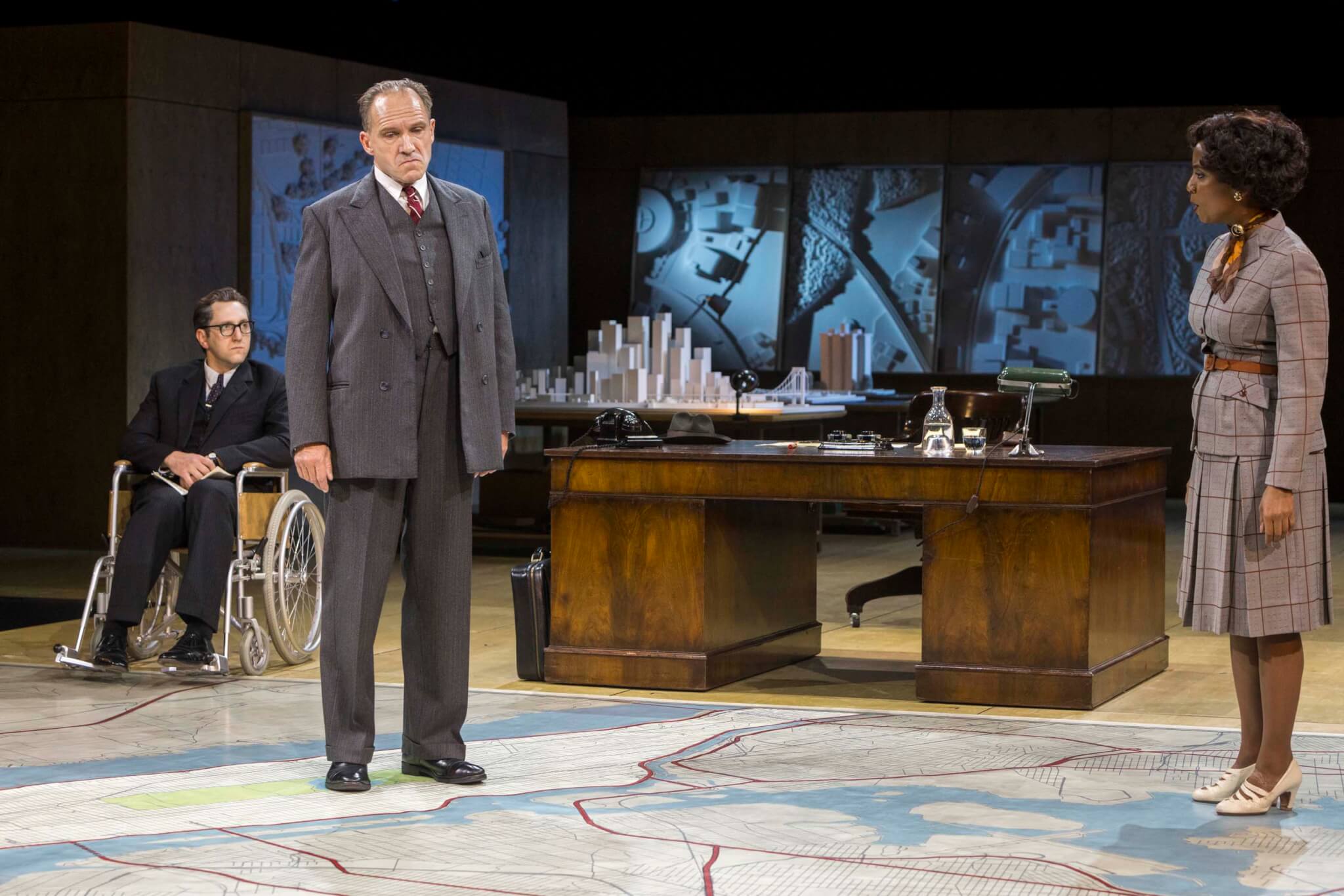
Scene after interminably long scene, Moses manages to outwit, outmaneuver, and out-yell his detractors, including Jane Jacobs, played in a perfectly smarmy register by Helen Schlesinger. In this production, Jacobs is a scold and proud of it, and when she addresses the audience, I can tell we are supposed to sympathize with her righteous struggle, but all I can think about is that Jacobs owned her home in the West Village. (Jacobs, like many other characters, breaks the fourth wall regularly, leaving it so demolished it often ceases to be sensed, to the equal detriment of both audience and characters.) While Straight Line Crazy wastes no time in letting us know Moses was a racist and a bigot, it also wants us to believe that, maybe just because she was a woman, the author of The Death and Life of Great American Cities was somehow immune to such diseases of the mind and heart.
Straight Line Crazy is, in short, a morality tale dressed up as a character study. Its first act sets up Moses as a kind of “Rebel with a Cause,” an “activist” planner with a vision that “anyone” could go to the beach. Its shallow gestures toward Moses’s disdain for those who didn’t own cars (read: poor people, Black people, Puerto Ricans) only register as mere whispers amidst Moses’s screaming proclamations of despising rich people and landowners, delivered to none other than Henry Vanderbilt (portrayed by a stately Guy Paul) in a private meeting. Vanderbilt, in turn, accuses Moses of being a revolutionary. In the following scene, back in Moses’s studio, represented via tables and rotating boards arranged across a spare plywood-heavy stage set, he yells that the “beach could belong to the people” with the half-awake conviction of someone who knows he has not earned the power he has but hasn’t realized it’s a whole lot less than he thinks.
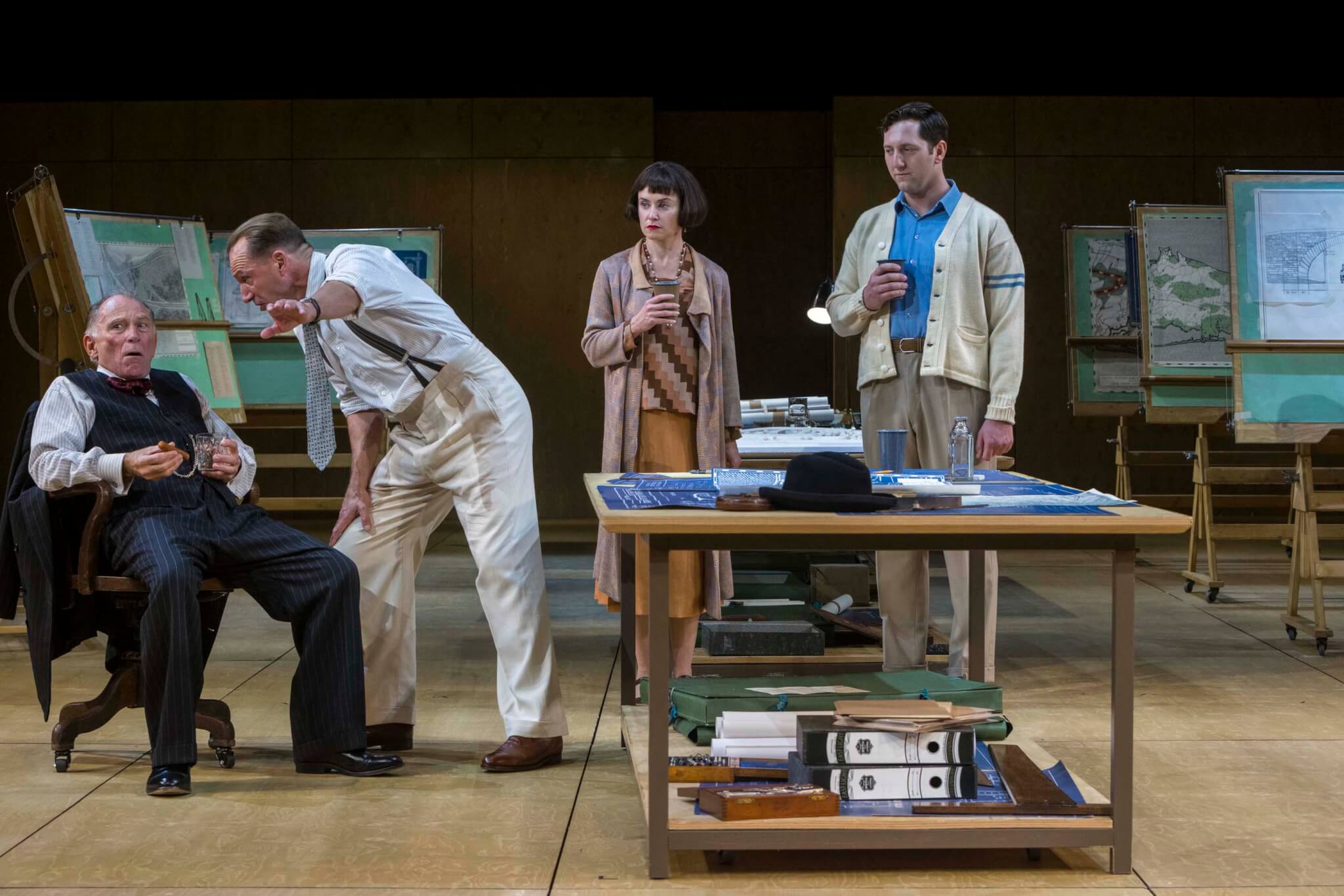
At some point, Al Smith (a blessedly hilarious Danny Webb) comes in as comic relief, the “Mick from the fourth ward” serving as a possible alter ego for Moses, a specter of who Moses could have been if he’d had the stomach or the spine to ever run for office, Hare seems to want us to believe. “You don’t come from the workers, Bob,” Smith admonishes, like a preview of what’s to come in Act Two, when we learn that what’s wrong with Moses is intractable, unchangeable, it has been with him since birth, and there is nothing he can do to buck it.
Straight Line Crazy exists in a universe where there are no good class traitors, only those of the kind that join ranks with those in power to see if they can improve the lot of those back home. (In the first act, it’s Judith Roddy’s Finnuala Connell, the only woman employee in Moses’s office; in the second, it’s Alisha Bailey’s Mariah Heller, Moses’s only Black employee, who happens to have family in the Bronx that Moses’s expressway tore up. Both are, crucially, entirely fictional characters.)
Moses’s impetuousness comes back to bite him in this second act, set about thirty years after the first. Finnuala, his longtime employee, devoted and underappreciated in equal measure, quits. She is fed up with his megalomaniacal ways and his disdain for the underprivileged, which she seems to have noticed only after Heller pointed them out—helpfully parachuting in to do so from Hare’s imagination and, based on the way she talks, a 2022 meeting of Housing Justice for All.
Moses, we are shown, is unhappy. His wife is dying, and he fears accusations of having neglected her. There is a crew of people getting together to stop his Washington Square Park project, and there is little he can do to halt their righteous anger. Jacobs appears again, approaching something that looks like victory. It is unclear how we got there. A lot must have happened during intermission, because, in fact, it’s unclear where we are at all. When Finnuala reveals her until now unmentioned husband and son left her because of how much she worked at Moses’s office, it feels like we have entirely lost our bearings.
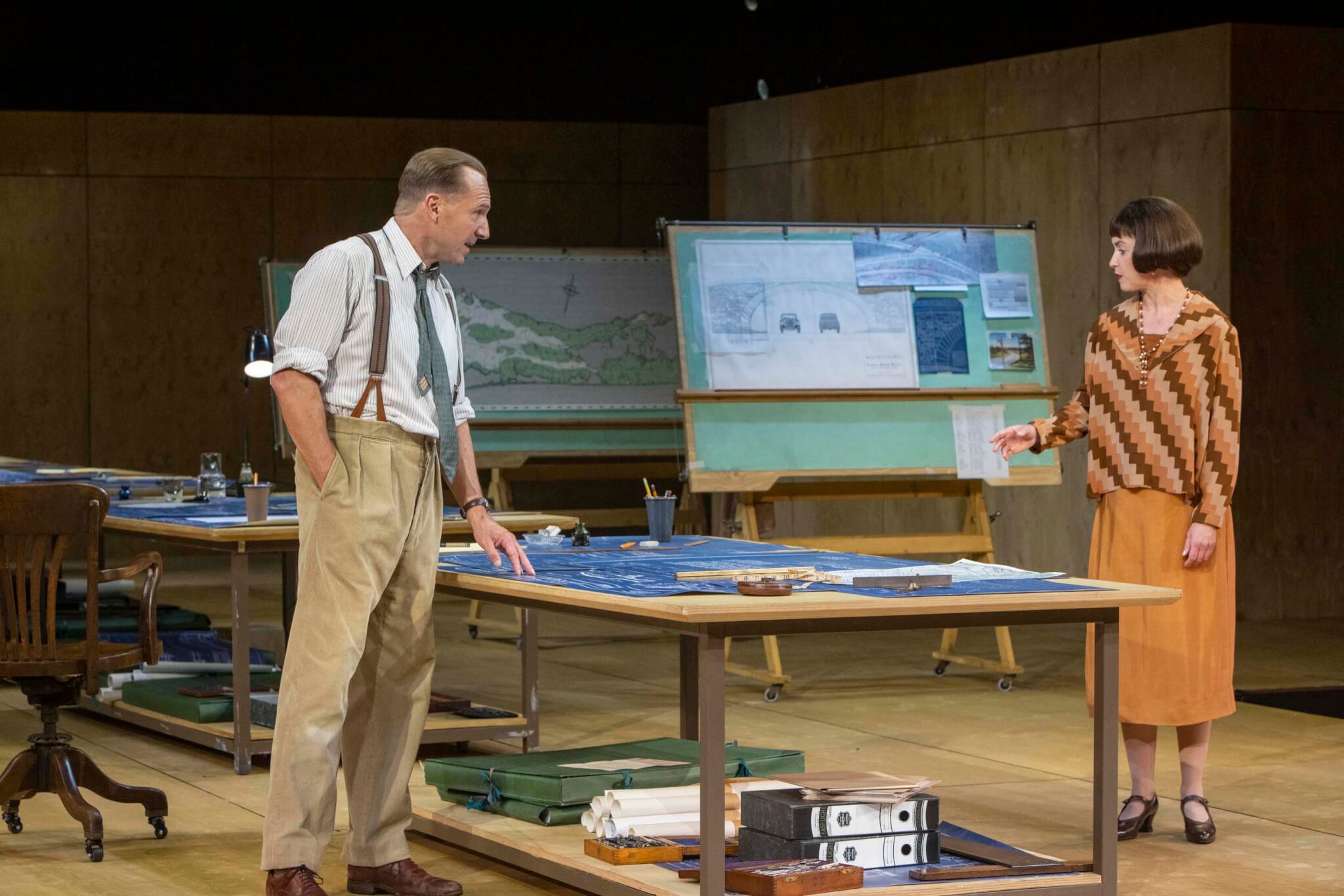
Her and Moses’s lives are falling apart, tensions are mounting around Washington Square Park, Heller is torn about needing a job and working for the man who displaced her uncles and cousins—what was the problem that begat all this misery? Was it that Moses was trying to design his way out of structural problems? Was it that he was willing to align himself with anyone who would let him draw up his plans? Was it that those with power in New York City made room for visions like his?
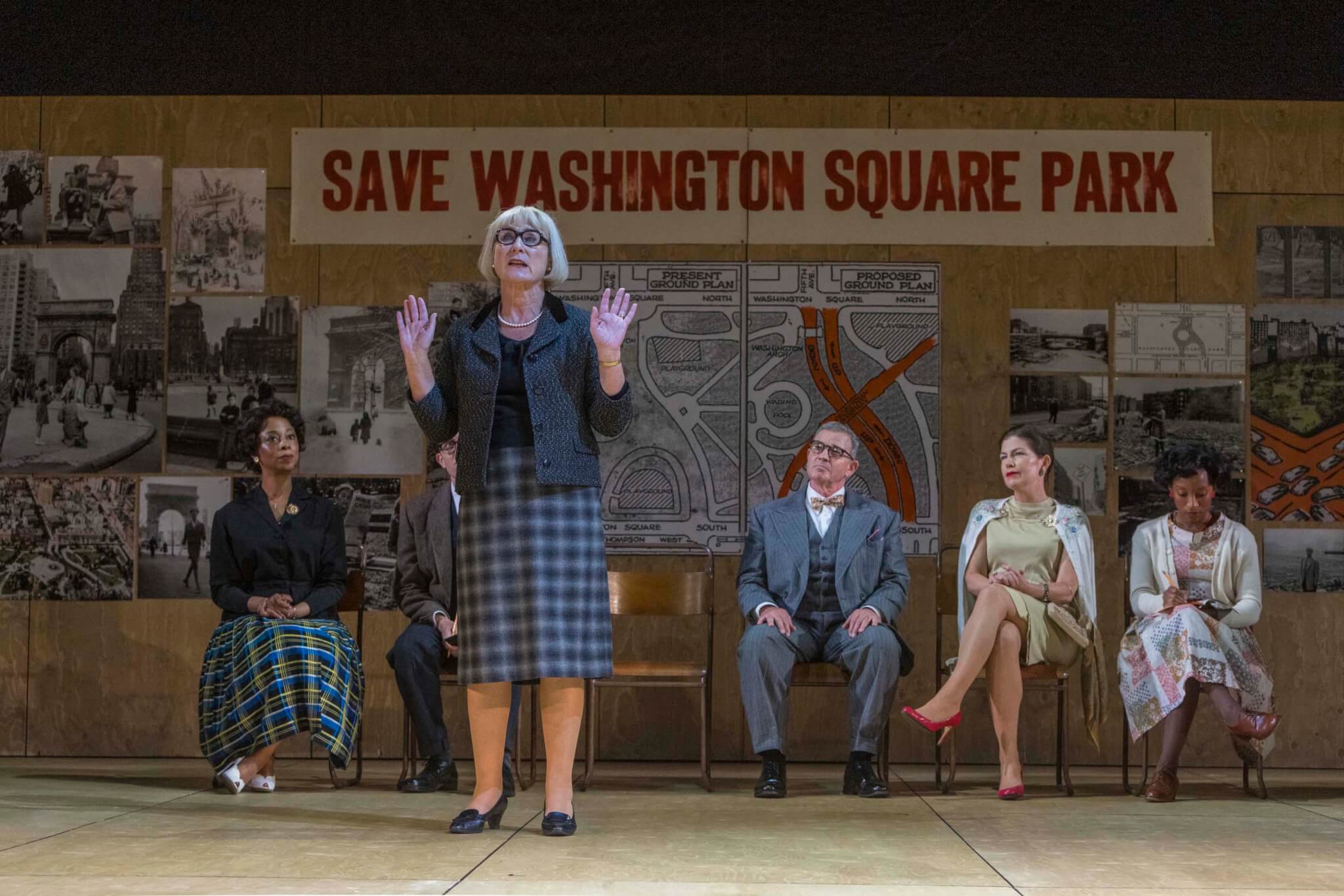
No, this whole time, we are meant to believe, as though we were children listening to a story at bedtime, the problem was that Moses’s soul was rotten, like an ogre or the Grinch, beyond redemption or salvation, as if we’d be interested in either of those things, as if the reason Moses is now regularly reviled is because of his personal shortcomings and not because of the political and social corruption for which his work and name have become shorthand, as if we can’t ourselves look around and see that the soaring rents, the decaying buildings, the piles of trash lining the streets in Weeksville, the rats in the MTA, and the shore falling into the ocean, among other countless calamities, are not products of people having the wrong morals but of the wrong interests having power.
Marianela D’Aprile is a writer in Brooklyn and the deputy editor of the New York Review of Architecture.











